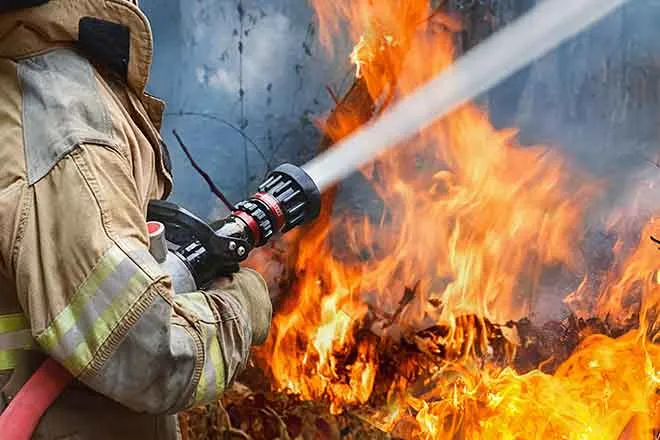
Daily Audio Newscast - November 4, 2025
© AlexLMX - iStock-823000260
Six minutes of news from around the nation.
Trump administration will provide only half of usual food stamp benefits in November; What's next for 600,000 Coloradans who lost SNAP food assistance; Latino advocates worry about long-term effects of racial profiling; Post-wildfires, toxic smoke a lasting health concern in CA.
TRANSCRIPT
The Public News Service Daily Newscast for Election Day, November the 4th, 2025.
I'm Mike Clifford.
The Trump administration said Monday it will provide only half of the normal food stamp benefits for November by tapping into the program's contingency fund amid the government shutdown.
But recipients are not likely to see the payments immediately.
That from CNN.
Meantime, more than 600,000 Coloradans are trying to figure out how they will put food on the table after the Trump administration stopped funding for the Supplemental Nutrition Assistance Program.
On Friday, two federal courts ordered the administration to tap billions in contingency funds to pay benefits.
But Governor Jared Polis says even if the administration complies, it could take weeks to get that money to families.
Brandon McKinley with the food pantry Metro Caring in Denver says there's been a spike in demand over the weekend.
He adds SNAP is not supplemental for people who rely on it.
For many, it's their full food budget.
We are talking people that are working really hard, sometimes one or two jobs, and still are making such a small amount of money that paying for food is out of the question when they're also looking at paying for rent that keeps raising year over year.
Two-thirds of the 42 million Americans who rely on SNAP are families with children.
After the Trump administration claimed it was illegal to use contingency funds during the government shutdown, Colorado and 24 other states filed a lawsuit.
In response to court deadlines on Monday, the administration said it will only make partial SNAP payments for November and will not tap additional money available through the USDA.
I'm Eric Galatas.
And as aggressive federal immigration efforts continue across Illinois, advocates are sounding the alarm about the widespread implications of racial profiling against Latino communities.
Latino immigrants are avoiding public places and practices they feel could make them easy targets but Edward Vargas, a fellow with the Brookings Institute, says the chilling effect of racially charged immigration efforts are not restricted to undocumented immigrants.
Vargas, who studies Latino communities, says a high percentage of Latino American citizens say they are also avoiding similar activities and even not reporting crimes for fear of being targeted.
What I could tell you from the research is that this constant feeling of being sort of hunted or that you have a crossbow on your back has really serious implications for people's physical and their mental health.
He says a recent U.S. Supreme Court decision that effectively legalized the racial profiling of Latinos sends a strong message and serves to further embolden federal immigration agents in cities like Chicago and across the country.
Vargas, who is Latino, shared his personal concerns about having to travel for work because he's afraid of being stopped by immigration officials.
When I was a child, I had a cousin who died in police custody, so my worry about being around a cop, I don't feel safe.
So this just kind of exacerbates this feelings of you're not here to protect me.
You're here to like do something bad to me.
I'm Judith Ruiz Branch reporting.
This is public news service.
Rural centric organizations remain worried about the loss of family farms and how it changes a town's identity.
They hope South Dakota farmers have more conversations about a transition plan.
Between 2012 and 2022, the number of South Dakota farms decreased more than 3600 while the average farm size increased.
Ag economists say that underscores the growing presence of corporate owned industrial style farms.
Roy Kaufman of the group Rural Revival says even if those bigger farms keep some economic activity flowing it can't replace the community feel often associated with small to mid-sized operations led by people woven into the town's fabric.
Our churches are dwindling, our schools are shrinking, you know the
He says aging farmers faced with unpredictable market forces these days might be tempted to sell their land to the highest bidder.
Kaufman's group is working alongside Dakota Rural Action and the Land Stewardship Project to educate producers facing these situations.
A series of winter transition classes will happen in Freeman from late January through mid-March.
I'm Mike Moen.
Next to Maine where folks are encouraged to avoid alternative or unregulated health plans as open enrollment through coverme.gov gets underway.
Experts say people worried that enhanced subsidies may not be available to lower monthly premiums should remain cautious of non-marketplace plans which often lack comprehensive coverage.
Ann Wollison with the Augusta-based Consumers for Affordable Health Care says many catastrophic plans carry extremely high deductibles and can result in significant out-of-pocket costs.
Buying something that's not regulated, it does not provide consumer protections or coverage or pre-existing conditions, isn't that the solution that Mainers are looking for?
She says local trained assisters are available both in-person and online to help people choose the right marketplace plan for them.
That help can be found on the coverme.gov website or by calling the Consumers for Affordable Healthcare hotline.
I'm Catherine Carley.
Finally, cutting edge technology deployed in the wake of LA fires is helping scientists understand the nature of the toxic smoke from urban wildfires.
Researchers from UCLA, UC Davis, Harvard, and the University of Texas at Austin deployed what they call a sniffer van in the Pacific Palisades and Altadena for several weeks in February and May to measure air pollution in the burn zone.
Chemist Pavel Mishtal, a professor at UT Austin, is using a supercomputer to analyze reams of data to identify hotspots and understand how different sources contribute to air pollution.
With every second we see more than 1,000 different chemicals and how they change over time.
So this novel way of mapping chemistry from an electric mobile van is game changing.
I'm Suzanne Potter.
This is Public News Service.

















